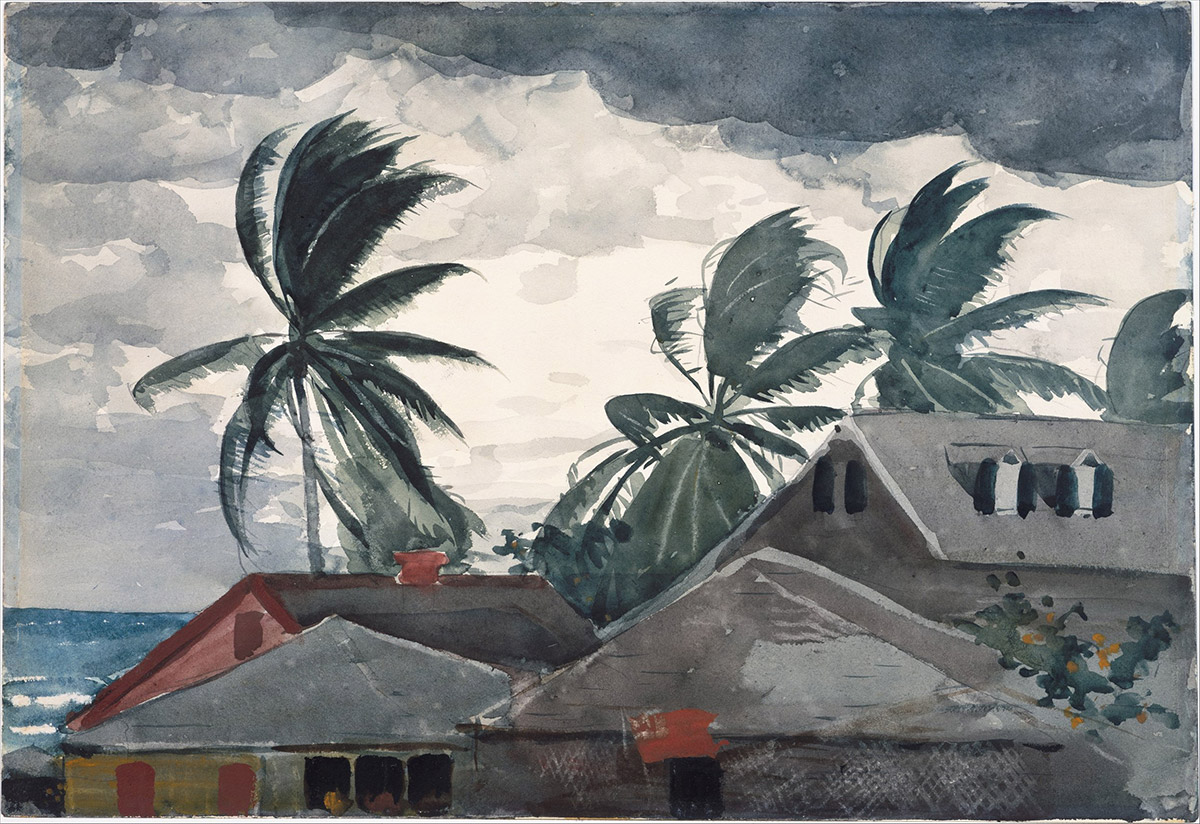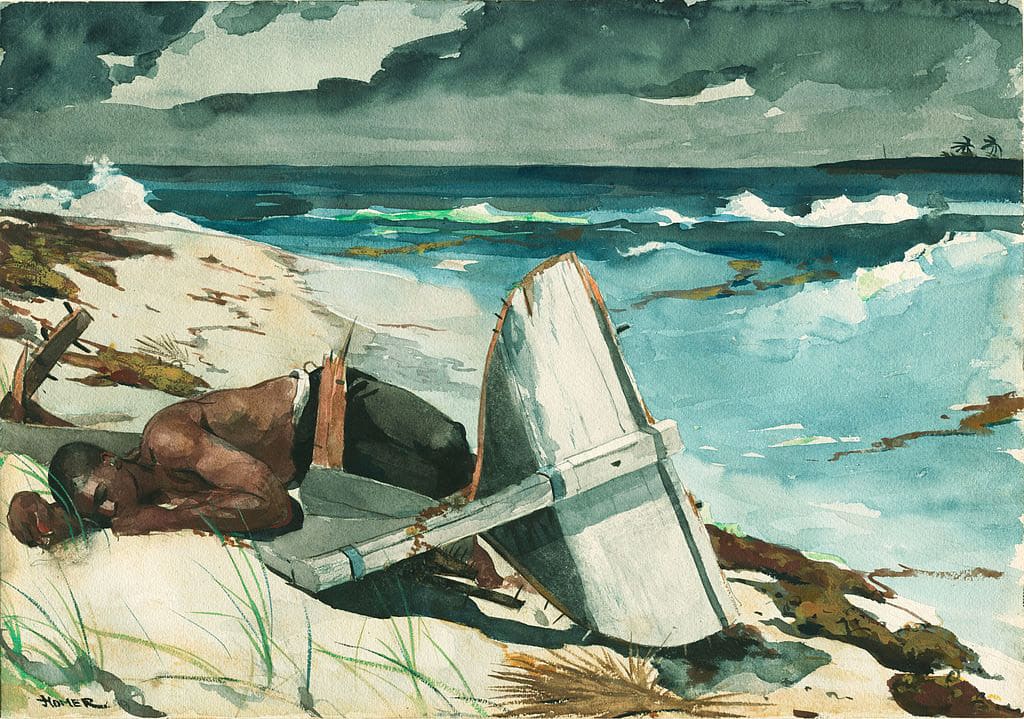Winslow Homer’s ‘Hurricane’ captures howling winds of the storm in The Bahamas, however, the image, though teaming with meaning and feeling, does not capture the magnitude of today’s super storms. These so-called superstorms bring with them devastation and trauma of epic proportions. The visual produced in Homer’s painting remains haunting and provides an interesting couple for the Gulfstream painting, and After the Hurricane, Bahamas as it shows a man shipwrecked on a desolate island.

These images speak to the prevailing threat of bad weather, but none of them capture the level of fury embodied by so many recent hurricanes as storms become more furious, poverty deepens, and sustainability becomes a question of whether people abandon old habitats in favour of more hospitable and secure lands. I wanted to draw on the way Jordana Kelly in her recent prize-winning work examines the concept of cultural preservation and couple this with how hurricanes devastate the land creating new traumas and realities previously unforeseen. I also wanted to see the savagery of the sea and the hell storm of nature as it pounds us into submission, yet we do not submit.
Devastation challenges the marketing lingo of a stronger Bahamas as each passing storm pummels the islands. The landscape changes and along with that our ability to identify with our history, pass on our culture and create a thriving Bahamian art-scape are eclipsed. When we experience such trauma of natural fury, we lose our tether and our place in the universe easily shifts. Sadly, the shifting of cultures and populations due to natural disasters has become a common phenomenon.
Erasure is no longer a far-fetched threat. It has come home to many folks, think on Sri Lanka, a tea producer, suffered massive losses in the Tsunami 2004. Think of Katrina and the gentrification due to the shifting demographics of neighbourhoods. Think too of what could happen in the Carolinas post-Matthew –the Carolinas are extremely important to early Bahamian history and settlement, and to speech and cultural patterns today. We cannot inhabit sealed plastic containers that remove us from the threat of nature’s wrath, but we can create systems that allow us and our culture to thrive and survive.
Ms. Kelly’s work has struck a chord, though many may not quite get it because of its apparent mundaneness, it does make us step back and think, which is something we are resistant to. We are even more resistant to interrogating our history. Hurricanes are meant to be natural cleaners, but what happens when nature sweeps away the roots of a culture? What happens when government policy and national development no longer go hand in hand? What happens when a national identity and artistic voice, though divergent and flamboyant at some moments, low-key and understated at others, are silenced through plans hostile to national creation? We have come to a point in a narrative where we are slowly losing voice, our story and identity rooted in 700 islands, not through natural disaster alone, but through poor vision and lack of real planning.
The history of Bahamian identity and creative expression includes Champion Brand tinned goods, and now, what Kelly sees as the end of a tradition. As more and more ‘Tru-Tru Bahamian’ tings disappear and more international objects surface, the uniqueness of the islands slowly fades away. When we talk about tourism, for example, we talk about large hotels or resorts that import almost one hundred per cent of their goods from the United States, a death knell for sustainability. So, the curtain descends on the creation of history-laden ubiquitous Bahamian products, once resilient.
Where is the silver lining? As yet another Bahamian company dematerialises into the ashes of memory, which soon fade because they become intangible, paved over by progress and first world status, there are no others to take up the mantel. The devastation of Winslow Homer’s After the Hurricane, Bahamas captures the decimation of blasting winds that uproot hundred-year-old trees, toss boats ashore, damaging industries beyond repair. The once lucrative fishing industry that people relied on is gone.

Much like farming, fishing will soon disappear for the small, independent fisherperson with one small boat and very local reach. The restructured coast, now gated off creates further boundaries, cutting off access, and those ways of life pass into distant memory. The second image shows a man washed up on shore after the hurricane. Is he dead or alive? Our imaginings alone can answer that. However, the image of rough seas battered land, compromised longevity and no preservation is poignant.
As Hurricane Matthew washed away the homes, lands, and livelihoods of people on the south coast of New Providence, Andros, Grand Bahama and, of course, a fragile Haiti that has still not recovered from the 2010 earthquake. When there is no longer land for the practice of traditional forms of culture and livelihood, then people either transition or disappear. When Dole upped sticks and moved to Hawaii, when Hatchet Bay farms were nationalised and then gutted, when citrus farmers on Abaco lost everything because of international diseases from the imported citrus that would also undercut their produce, each time a death knell landed thud, but no one heard it because no one was listening.
Our story was being erased as if written in pencil on paper that would reveal little if any trace of the erasures that went before. Memory is fickle! These vanishings or cultural erasures are their own kinds of hurricanes. They are like storm surges that roll in and wipe out homes; only these acts are subtle, quiet, and invisible to silence and disempower. Culture is extremely delicate, though arguably resilient; after decades of undermining local sustainability and cultural expression, the roots of the trees can withstand no more. Similar to beach erosion, we shift and change with time and tide. However, what remains of us?
The relative serenity, though dark and brooding as well as foreboding captured in the opening image of this essay, is totally shattered by the man strewn on a beach far away from home. His boat is destroyed, perhaps he is dead, his bones will be bleached by the sun, flesh eaten by sharks as the waves wash him onto and offshore. Hurricanes come faster and more furious to batter us, bruise us and untether our souls from their home. Where do we move to when the storm of historical silence and erasure has irrevocably altered our existence? Culture is fragile, even though it may not seem it.